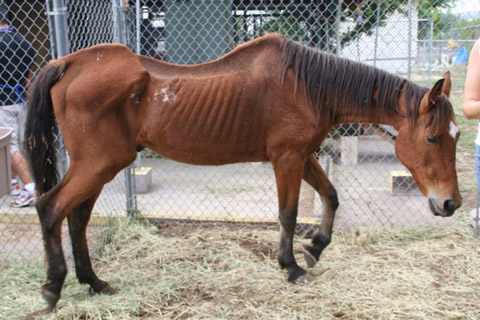
Used with permission from the Kentucky Horse Council.
You can view a pdf chart with examples by clicking HERE.
Everyone has a different mental picture of how a skinny horse looks, acts, and appears. Often the easiest way to determine if a horse needs to be investigated by authorities is to determine his or her body condition score using the Henneke Scale.
The Henneke Scale is a 1-9 system of evaluating fat cover on equines. A range of 4-7 is considered acceptable with a body condition score of 5 being ideal. Horses with body condition scores of 1 and 2 are considered emaciated and those with scores of 8 and 9 are obese. For more information about using the Henneke Scale to determine body condition score of horses visit the Kentucky Horse Council’s website. (Editor’s note: TheHorse.com offers a body condition score chart in PDF for download.)
Horses with body condition scores less than 3 warrant investigation and sometimes prosecution. It is important to note that older horses and those suffering from chronic illness may struggle to maintain body condition and should be judged accordingly.
One skinny horse in a herd of several otherwise healthy horses is typically either quite aged or suffering from a chronic condition. Sometimes, however, owners are unaware of herd dynamics and may need to make adjustments in the distribution of feed and/or number of feed receptacles available.
A herd of horses with body condition scores below 3 is concerning and requires investigation and possibly education with good follow-up or prosecution. In many cases it is best for the owner to learn how to provide better care for the animal. In the event that the owner is unwilling or unable to improve the conditions of the animal, further investigation and prosecution may be warranted.
In addition to poor body condition, other indicators of neglect may include untended wounds and illnesses and excessively long or curled hooves.
If you are aware of horses in poor condition with a body condition score less than 3 on the Henneke scale or suffering other types of neglect or abuse, it is appropriate to contact the county Animal Control Officer, accredited ASPCA, or local Humane Society. In the event that there is no Animal Control Officer, accredited ASPCA or local Humane Society, the next point of contact is the local sheriff’s office. State Police investigators may also be contacted regarding suspected animal neglect or abuse.
Don’t be alarmed if seemingly nothing happens. Often in neglect cases investigators will provide education and follow up for some time to encourage better management and care practices and/or to build a case against the offender.
Do not approach the owner yourself. This places you, your family, your home, your animals, and your personal possessions at significant risk. Although you may want to feed neglected horses, you should not without the consent of the proper authorities. If you do not know how and what to feed an emaciated horse you could accidently cause illness or death. Feeding neglected horses can also interfere with a legal investigation as authorities have no way to know that the owner or caretaker is not the person providing the feed and care.
Make sure you know the animal neglect and abuse statutes in your state and county before making a complaint. The section of Kentucky animal statutes applicable to horses requires animal owners to provide “adequate food, drink, space, and healthcare.” Some states require shelter for animals, Kentucky does not.
Many counties lack facilities and funding to provide care for horses which may limit their ability to confiscate or impound horses. If you have an interest in supporting the efforts of your county or state you might consider volunteering with your local shelter as a foster home for confiscated horses or at the shelter. You may also consider donating hay in the event that your county confiscates horses.
